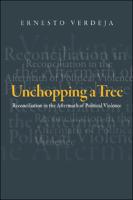Unchopping a Tree
Reconciliation in the Aftermath of Political Violence
Author(s)
Verdeja, Ernesto
Collection
Knowledge Unlatched (KU)Language
EnglishAbstract
Political violence does not end with the last death. A common feature of mass murder has been the attempt to destroy any memory of victims, with the aim of erasing them from history. Perpetrators seek not only to eliminate a perceived threat but also to eradicate any possibility of alternate, competing social and national histories. In this timely and important book, Ernesto Verdeja develops a critical justification for political reconciliation. He asks the questions “What is the balance between punishment and forgiveness?” and “What are the stakes in reconciling?”
Developing a normative theory of reconciliation that differs from prevailing approaches, Verdeja outlines a concept that emphasizes the importance of shared notions of moral respect and tolerance among adversaries in transitional societies. Drawing from reconciliation efforts around the world—and interviews with people involved in such endeavors—Verdeja debates how best to envision reconciliation while taking into account the very significant practical obstacles that confront such efforts.
Unchopping a Tree addresses the core concept of respect at four different social levels—political, institutional, civil society, and interpersonal—to explain the promise and challenges of securing reconciliation and broader social regeneration.
Keywords
Political Science; Human Rights; Political Science; Philosophy; Ethics & Moral Philosophy; Technology & Engineering; AgricultureISBN
9781439900567Publisher
Temple University PressPublication date and place
2009Imprint
Temple University PressClassification
Human rights, civil rights
Politics and government
Ethics and moral philosophy
Agriculture and farming


 Download
Download